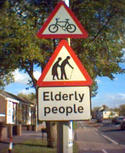Anyone who challenges the notion that the long predicted exodus of people from the suburbs to the city has been wildly overstated is sure to generate some backlash from urban boosters. Alan Berube of the Brookings Institution contends in a New Republic column that "head counts" better reveal city trends than property trends or the massive condo bust. read more »
Stagnation in the City of Angels: Whatever Happened to Ideas?
It’s only been a couple of years since a red-hot real estate market had our city riding high. The market turned out to be a bubble, of course, and it eventually burst. Gone is the giddiness that comes when folks convince themselves that real estate or high tech stocks or any other trend or commodity can defy gravity and continue upward forever.
Yet giddiness isn’t the only thing that’s been lost. Ideas have disappeared from the political landscape of Los Angeles. read more »
Economics: Green Shoots & Immigration
A year ago we were hearing all about green shoots. Analysts claimed to find them everywhere.
Today, we never see the term. In fact, there seems to be a growing malaise. By the end of June the first quarter’s Gross Domestic Product (GDP) estimate was revised downward a full half a percent, to 2.7 percent. Pundits are depressed. read more »
Demographics: The Elderly Dividend
Some 40 million Americans are now over age 65, and about 6 million are over 85. In the land of Denny’s, anyone over 55 can order the senior platters. Would I be right in guessing that 30 million American children spend part of their time looking after their parents?
Like many baby boomers, I spend a considerable amount of my time in the company of my ninety-something parents. That involves fixing meals, opening car doors, reading Maureen Dowd aloud from the newspaper, adjusting hearing aids, listening to doctors, cleaning out the garage, and cajoling them to eat more or less food. read more »
The Need to Expand Personal Mobility
Few books in recent memory have started from as optimistic or solid a foundation as Reinventing the Automobile: Personal Urban Mobility for the 21st Century. Reinventing the Automobile conveys a strong message that improved personal mobility is necessary and desirable: read more »
Singapore's Demographic Winter
Over the past half century arguably no place on earth has progressed more than the tiny island state of Singapore. A once impoverished, tropical powder keg packed into 268 square miles at the foot of the Malay Peninsula, the Mandarin-led republic has ascended from its difficult founding in 1965 to one of the richest economies on the planet. Today, in terms of purchasing power, its per capita income stands higher than most European countries' or Japan's and is roughly equal to that of the U.S. read more »
The Myth of the Back-to-the-City Migration
Pundits, planners and urban visionaries—citing everything from changing demographics, soaring energy prices, the rise of the so-called "creative class," and the need to battle global warming—have been predicting for years that America's love affair with the suburbs will soon be over. Their voices have grown louder since the onset of the housing crisis. Suburban neighborhoods, as the Atlantic magazine put it in March 2008, would morph into "the new slums" as people trek back to dense urban spaces. read more »
"Little Monsters"? Children and the Environment
The idea has bubbled around the edges of the environmental pond for a while: choosing to be childfree expressly for the purpose of reducing one's carbon footprint. read more »
The Economic Significance of Village Markets
Flea markets and garage sales have been around for years. But for most New Zealanders, produce markets have been associated with old European villages, or the ethnic markets of Hong Kong and other exotic locations. Village markets focus on locally made crafts, while Flea Markets are essentially centralized garage sales. read more »
- Login to post comments
Sponge Cities on the Great Plains
“Sponge cities” is an apt metaphor to describe urban communities in rural states like North Dakota which grow soaking up the residents of surrounding small towns, farms and ranches. North Dakota’s four largest cities, Fargo, Bismarck, Grand Forks and Minot, are growing in large part due to the young adults who for decades gone elsewhere to other regions. In the process, rural North Dakota is facing a protracted population crisis as significant numbers of its small communities are on a slow slide to extinction. This migration pattern is not new, nor is it unique to North Dakota. read more »





















